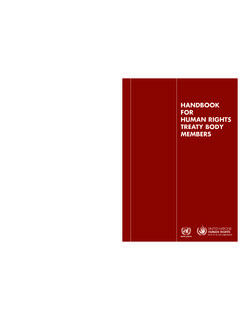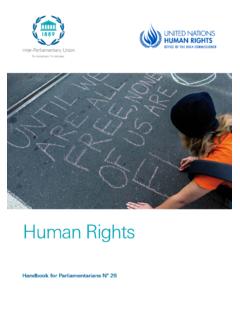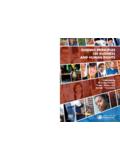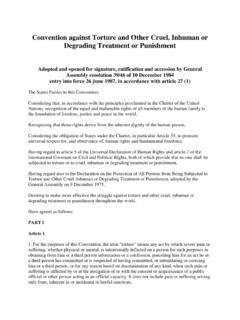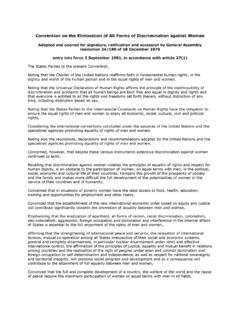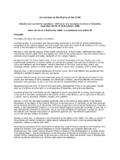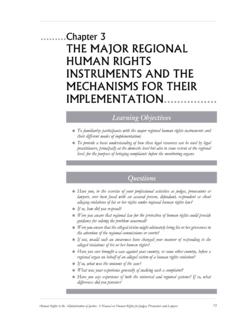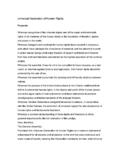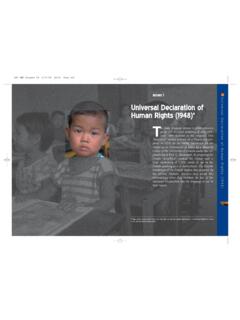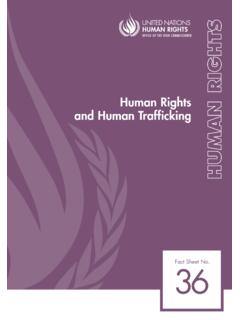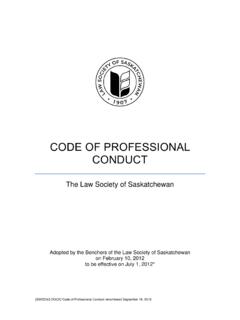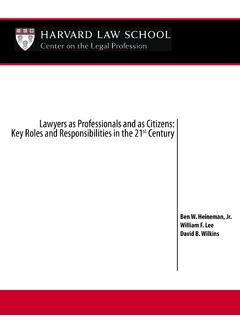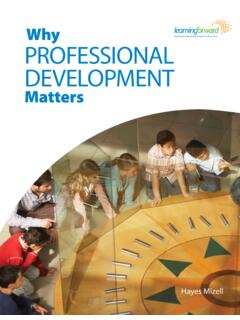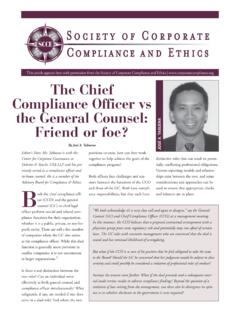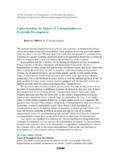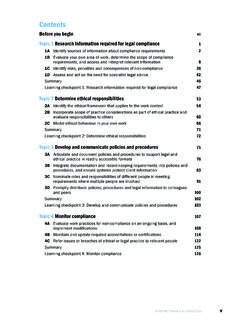Transcription of Chapter 4 INDEPENDENCE AND IMPARTIALITY OF JUDGES ...
1 Chapter 4 INDEPENDENCE ANDIMPARTIALITY OFJUDGES, PROSECUTORSAND ObjectiveslTo consolidate knowledge and understanding of the importance of an independentand impartial Judiciary, independent and impartial prosecutors and an independentlegal profession in order to ensure the rule of law and effective protection of thefundamental rights and freedoms of the human familiarize participants with the existing international and regional legal rulesand principles governing the functioning of the Judiciary, prosecutors and lawyers ,including the relevant do you, as JUDGES , prosecutors and lawyers , perceive the role of the principle ofseparation of powers?lHow is this principle ensured in your country?lHow are the INDEPENDENCE and IMPARTIALITY of the Judiciary and the INDEPENDENCE oflawyers guaranteed in the country where you carry out your work?lHave you ever experienced any difficulties in performing your professional duties inan independent and impartial manner?
2 LIf so, what were those difficulties, and how did you deal with them?lMore specifically, have you, as JUDGES , prosecutors and lawyers , ever been confrontedwith attempts to corrupt you?lIf so, how did you deal with such propositions?Human Rights in the Administration of Justice: A Manual on Human Rights for JUDGES , Prosecutors and Lawyers113 Questions ( )lFor those participants who are women jurists, have you, in the course of your work,experienced any specific problems, difficulties or harassment that may be attributableto your gender?lIf so, how did you confront the problems, difficulties, or harassment?lIf you have had to deal with any of the above situations, were you aware of theexistence of international legal standards aimed at strengthening the role of theJudiciary and the legal professions in general that might have been conducive tostrengthening your position vis- -vis the Executive, Legislature or other groups orpersons acting with or without the connivance of the State?
3 LLastly, in your country, would there be any room for you, as JUDGES , to soften the effectof repressive laws by means of interpretation?Relevant Legal InstrumentsUniversal InstrumentslThe International Covenant on Civil and Political Rights, 1966**lBasic Principles on the INDEPENDENCE of the Judiciary, 1985lGuidelines on the Role of Prosecutors, 1990lBasic Principles on the Role of lawyers , 1990 Regional InstrumentslThe African Charter on Human and Peoples Rights, 1981lThe American Convention on Human Rights, 1969lThe European Convention on Human Rights, 1950**lCouncil of Europe Recommendation No. R (94) 12 of the Committeeof Ministers to Member States on the INDEPENDENCE , efficiency and roleof Rights in the Administration of Justice: A Manual on Human Rights for JUDGES , Prosecutors and LawyersChapter 4 INDEPENDENCE and IMPARTIALITY of JUDGES , Prosecutors and Lawyers1In addition to these binding and non-binding legal sources, ethical standards have been adopted by professional associationssuch as JUDGES , prosecutors and lawyers associations.
4 Such standards may provide useful guidance to the legal professions. See following standards adopted by the International Bar Association (IBA): IBA Minimum Standards of Judicial INDEPENDENCE , 1982;IBA Standards for the INDEPENDENCE of the Legal Profession, 1990. See also the IBA statement of General Principles for Ethics ofLawyers, IBA Resolution on Non-Discrimination in Legal Practice, as well as the IBA paperJudicial Corruption Identification, Preventionand Cureof 14 April 2000. These documents can be found at the IBA web site: IntroductionThis Chapter will deal with two of the fundamental pillars of a democraticsociety respectful of the rule of law and the effective protection of human rights,namely,the INDEPENDENCE and IMPARTIALITY of the judiciary and prosecutors,andthe INDEPENDENCE of lawyers . It will first describe the role played by JUDGES ,prosecutors and lawyers in this regard.
5 And secondly, will focus on the various legallimitations on, and de facto threats to, the ability of JUDGES , prosecutors and lawyers toexercise their professional responsibilities in an independent and impartial , this Chapter will analyse the existing international legal standards relating to thefunctioning of the legal professions and selected relevant The Role of JUDGES , Prosecutorsand lawyers in Upholding theRule of Law, Including HumanRights StandardsIn the modern constitutional State, the principle of an independent Judiciaryhas its origin in the theory ofseparation of powers, whereby the Executive, Legislatureand Judiciary form three separate branches of government, which, in particular,constitute a system of mutual checks and balances aimed at preventing abuses of powerto the detriment of a free society. This INDEPENDENCE means that both the Judiciary asan institution and also the individual JUDGES deciding particular cases must be able toexercise their professional responsibilities without being influenced by the Executive,the Legislature or any other inappropriate an independent Judiciary is able to render justiceimpartiallyon thebasis of law, thereby also protecting the human rights and fundamental freedoms of theindividual.
6 For this essential task to be fulfilled efficiently, the public must have fullconfidence in the ability of the Judiciary to carry out its functions in this independentand impartial manner. Whenever this confidence begins to be eroded, neither theJudiciary as an institution nor individual JUDGES will be able fully to perform thisimportant task, or at least will not easily beseento do , the principle of INDEPENDENCE of JUDGES was not invented forthe personal benefit of the JUDGES themselves, but was created to protect human beingsagainst abuses of power. It follows that JUDGES cannot act arbitrarily in any way bydeciding cases according to their own personal preferences, but thattheir duty is andremains to apply the the field of protecting the individual, this also means thatjudges have a responsibility to apply, whenever relevant, domestic and internationalhuman rights Rights in the Administration of Justice.
7 A Manual on Human Rights for JUDGES , Prosecutors and Lawyers115 Chapter 4 INDEPENDENCE and IMPARTIALITY of JUDGES , Prosecutors and LawyersA legal system based on respect for the rule of law also needs strong,independent and impartial prosecutors willing resolutely to investigate and prosecutesuspected crimes committed against human beings even if these crimes have beencommitted by persons acting in an official JUDGES and prosecutors play their respective key roles to the full inmaintaining justice in society, there is a serious risk that a culture of impunity will takeroot, thereby widening the gap between the population in general and the authorities. Ifpeople encounter problems in securing justice for themselves, they may be driven totake the law into their own hands, resulting in a further deterioration in theadministration of justice and, possibly, new outbreaks of , this legal system would not be complete without independent lawyerswho are able to pursue their work freely and without fear of reprisals.
8 Indeed,independent lawyers play a key role in defending human rights and fundamentalfreedomsat all times, a role which, together with that played by independent andimpartial JUDGES and prosecutors, is indispensable for ensuring that the rule of lawprevails, and that individual rights are protected this regard it has been pointed out that all special rapporteurs of the UnitedNations Commission on Human Rights have emphasized the close relationship thatexists between the greater or lesser respect for the due process guarantees of article 10of the Universal Declaration of Human Rights and the greater or lesser gravity of theviolations rights and fundamental freedoms are, in other words, all the better safeguarded to the extent that the judiciary and the legal professions areprotected from interference and pressure .43. Challenges to the Independenceand IMPARTIALITY of the LegalProfessionsIn spite of the need for JUDGES , prosecutors and lawyers to exercise theirprofessional responsibilities in true INDEPENDENCE , experience shows that they are oftensubjected to pressures of various kinds aimed at compromising their ability to do instance, although the way in which JUDGES are appointed varies fromcountry to country, there may be a danger to their INDEPENDENCE where they areappointed exclusively by the Executive or Legislature, or even where they are elected.
9 Afurther threat to their INDEPENDENCE is posed by lack of security of tenure, as arises incountries where JUDGES are generally employed on temporary contracts. Such insecuritymay make JUDGES more susceptible to inappropriate outside pressure. Inadequate116 Human Rights in the Administration of Justice: A Manual on Human Rights for JUDGES , Prosecutors and LawyersChapter 4 INDEPENDENCE and IMPARTIALITY of JUDGES , Prosecutors and Lawyers2 See UN doc. , report of the Special Rapporteur of the Commission on Human Rights on extrajudicial, summary orarbitrary executions, para. doc. , report on the INDEPENDENCE of the judiciary and the protection of practising lawyers , para. , loc. may also constitute a threat to the INDEPENDENCE of JUDGES in that it mayfor instance make them more amenable to , the INDEPENDENCE of JUDGES , prosecutors and lawyers isfrequently threatened by the refusal of the Executive to allow them to organize freely inprofessional associations.
10 For instance, where the Executive issues licences to lawyersand obliges them to exercise their profession as members of State-run professionalorganizations, they cannot carry out their work , JUDGES , prosecutors and lawyers are frequently also subjected toother kinds of persecution. Such acts may involve public criticism by either theExecutive or Legislature aimed at intimidating the legal professions, but they also oftentake the form of arbitrary detentions and direct threats to their lives, including killingsand some countries the fact of being a woman lawyer further addsto the precariousness of the profession. Because of their willingness to take up thedefence of cases involving the sensitive issue of women s rights, these lawyers faceintimidation and violence, sometimes resulting in threats and attacks described above are not only perpetrated by Stateauthorities, but are frequently also carried out by private individuals, eitherindependently or in connivance with bodies such as criminal organizations and , unless JUDGES , prosecutors and lawyers are able to exercise theirprofessional duties freely, independently and impartially, and unless the Executive andthe Legislature are likewise always prepared to ensure this INDEPENDENCE , the rule of lawwill slowly but steadily be eroded, and with it effective protection of the rights of theindividual.
